Top 5 Tips to Help Your ADHD Teen Thrive | Ryan Wexelblatt, LCSW, ADHD Dude

If you’re parenting a teen with ADHD, you’ve probably noticed a big shift. All the charts, stickers, and reward systems that worked when they were younger? They don’t seem to help anymore. The emotional reactions are stronger. The motivation feels lower. And somewhere along the way, your teen may have started pulling away while still depending on you for almost everything.
I’m Ryan Wexelblatt, a licensed clinical social worker, former school social worker, and the father of a teenager with ADHD. After more than 20 years of working with kids who struggle with executive functioning, I created the ADHD Dude Membership to give parents practical tools that make a real difference, especially during the teen years.
Here are five ways to help your teen with ADHD grow in maturity, confidence, and independence.
When Reward Systems Stop Working for Teens with ADHD
Many parents discover that once their child becomes a teenager, the old reward systems stop working. That’s because teenage brains change. Teens with ADHD need to feel ownership, usefulness, and purpose, not just rewards for compliance. This stage isn’t about stickers or charts anymore. It’s about teaching life skills, decision-making, and accountability in ways that build confidence instead of resistance.
1. Set Clear Expectations and Help Them Feel Useful
When structure fades during the teen years, many kids with ADHD start to become:
- Inflexible at home (even if they’re fine at school)
- Emotionally immature
- Entitled or self-focused
Underneath those behaviors, they often feel disconnected and unnecessary. Your teen needs to feel useful. Having responsibilities and routines that contribute to family life builds both maturity and purpose.
It could be setting the table, helping with dinner, or organizing a younger sibling’s backpack. The task doesn’t matter as much as consistency. If creating this structure feels hard, the Creating Daily Expectations (ages 4-7, and 8+) in the ADHD Dude Membership offers a clear, parent-friendly way to start.
2. Cultivate Flexibility Without Accommodating Inflexibility
Cognitive flexibility is one of the most important executive function skills for teens with ADHD. It’s the ability to:
- Shift gears when things don’t go their way
- Handle unexpected changes
- Accept “no” without escalating
Around ages 14 and 15, inflexibility often gets worse, especially if we unintentionally accommodate it. I call this the Inflexibility Tipping Point. Even if your teen has reached that point, change is possible. It takes calm consistency, not rigidity. Start by setting limits kindly and holding them, even when it’s uncomfortable.
You can learn more about this process inside the Executive Function Crash Course (ages 8–17) included in the ADHD Dude courses and on the ADHD Dude YouTube channel.
3. Have Realistic Conversations About Life After High School
Around age 14, it’s time to shift from “you can be anything you want” to empathetic realism. This doesn’t mean limiting dreams. It means helping your teen understand effort, fit, and backup plans.
When my son told his psychiatrist he wanted to be an engineer, she said gently, “You can do that, but it will take a lot of schoolwork, and you’ll need to build skills that are hard for you right now.”
She didn’t discourage him. She gave him honest information.
Try saying, “It’s great to want to be a YouTuber. But lots of people want that too. What’s your backup plan?”
These kinds of conversations help teens develop realistic thinking and self-awareness, skills they’ll rely on far beyond school.
4. Let Your Teen Practice Self-Advocacy and Problem Solving
If you’re always stepping in to fix things, emailing teachers, explaining ADHD to others, or smoothing over every conflict, your teen might start believing they can’t handle life without you.
That doesn’t build confidence. It builds dependence.
Teens with ADHD need real-life practice to:
- Speak for themselves
- Navigate disagreements
- Ask for help appropriately
One helpful strategy is coaching from the background. When my son faced a difficult situation, I’d text him a few ideas for what to say, then let him handle it. Self-advocacy doesn’t grow from lectures or therapy sessions. It grows through repetition, responsibility, and real-world experience.
5. Give Them Independence, Even When It Feels Uncomfortable
Teens gain confidence by facing challenges, not avoiding them.
I often talk about the Four D’s, a concept based on the work of Dr. Camilo Ortiz. These are the kinds of experiences teens need to build resilience:
- Discomfort
- Distress
- Disappointment
- Mild danger
When we protect them from every “D,” we block opportunities for growth.
Here’s an example from my own experience. When my son was 14, we were in Vancouver. After an argument, I said, “If you don’t want to do this activity, you can take the subway back to the hotel.” To my surprise, he did, alone, in a city he didn’t know. I was nervous, but he made it back safely. That experience built his confidence more than any pep talk ever could.
Teens learn how capable they are by doing hard things, not by being told they can.
Building Confidence and Maturity Takes Time
These strategies take patience, structure, and courage to implement. You won’t see change overnight, but you will start to see progress, both in your teen and in yourself.
Inside the ADHD Dude Membership, you’ll find courses that walk you through these strategies step-by-step, including:
- Scaffolding Better Behavior (ages 8–17)
- Creating Daily Expectations (ages 4-7, and 8+)
- Executive Function Crash Course (ages 8–17)
Each course is designed to help parents raise capable, confident, and independent teens without constant battles or reminders. If you’re ready to support your teen’s growth with tools that work, these resources can guide you through every step of the process.
FAQ:
Q: Why don’t reward systems work for teens with ADHD?
A: Reward systems often stop working because teens with ADHD need to feel capable and purposeful, not just rewarded for compliance. As they mature, they crave independence and ownership of their actions. Building structure and responsibility helps them stay motivated more than stickers or incentives ever could.
Q: How do I set expectations without constant arguments?
A: Keep expectations clear, consistent, and realistic. Instead of repeating reminders or lecturing, create written or visual routines your teen can follow. This shifts responsibility to them and reduces power struggles. If you need a starting point, the Creating Daily Expectations (ages 4-7, and 8+) course shows how to set structure that actually works for ADHD teens.
Q: What should I do when my teen refuses to be flexible?
A: Stay calm and avoid accommodating inflexibility. Hold limits kindly but firmly and let natural consequences play out when possible. Teens learn flexibility through experience, not arguments. Consistency over time helps them adjust, even if change feels slow.
Q: How can I help my teen become more independent without failing?
A: Independence grows through practice, not perfection. Give your teen age-appropriate freedoms and let them handle real-life challenges, even if they stumble. Facing discomfort and solving problems builds confidence far more effectively than constant reassurance.
Q: What are the best ADHD Dude courses to help with this stage?
A: Inside the ADHD Dude Membership, you’ll find step-by-step guidance through:
- Scaffolding Better Behavior (ages 8–17) for supporting behavior growth
- Creating Daily Expectations (ages 4-7, and 8+) for building consistent routines
- Executive Function Crash Course (ages 8–17) for developing independence and follow-through
These courses work together to help you support your teen’s growth toward maturity and confidence.











